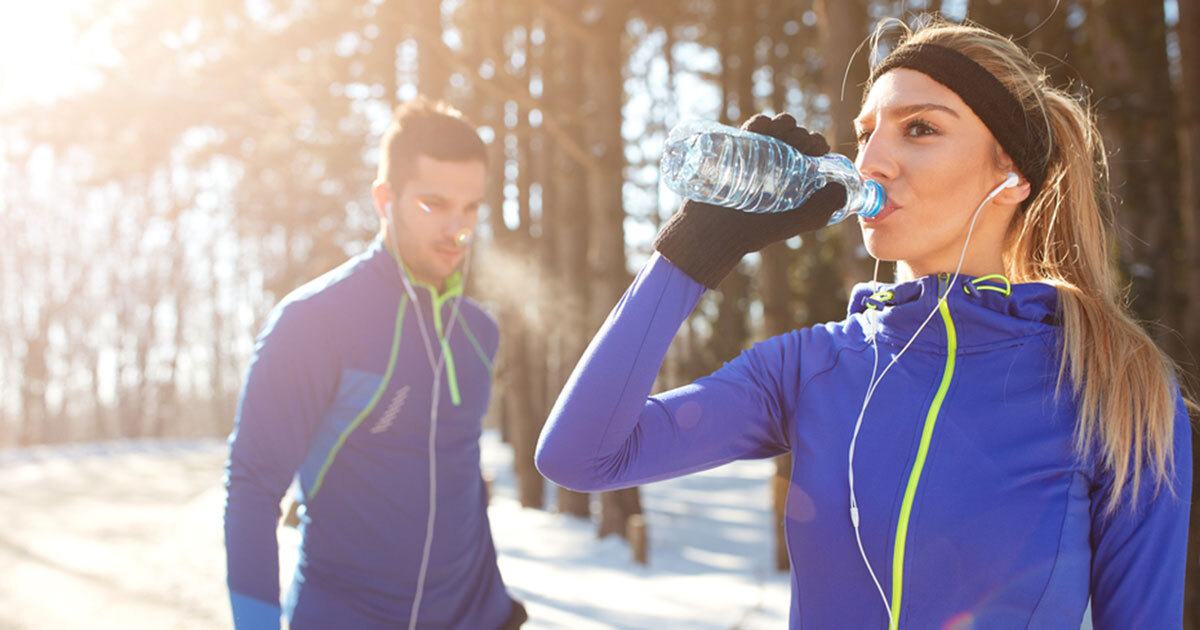
There’s an old saying that if you’re thirsty, you’re already dehydrated. After all, your body knows when the ol’ water tank could use a top off—that’s why you have thirst sensations. Thirst sensations are normal—they’re used by your body to regulate blood pressure and nutrient imbalances. Dehydration, however, is a serious medical condition.
If you don’t listen to your thirst sensations, you could wind up dehydrated! Preventing winter dehydration is especially important because many people don’t realize they are at risk of becoming dehydrated in the winter.
Keep reading to learn how to protect yourself from winter dehydration.
Surprisingly, there are many ways you can become dehydrated in winter. In fact, studies show your risk of becoming dehydrated increases in cold weather!
Thirst sensation decreases in the winter, so people typically drink less water in cold weather, which can lead to dehydration.
Water makes up about 90 percent of blood volume, so when you’re not adequately hydrated, the amount of blood in your body actually decreases. Typically, your brain triggers a thirst sensation when it detects a decrease in your blood volume. That thirst sensation is your body asking you to start replenishing its water supply so that you don’t become dehydrated.
In the winter, your body keeps blood closer to your core—around your vital organs—to keep you warm. This process is known as vasoconstriction. Because your vital organs are sufficiently supplied with blood, your brain doesn’t detect the decrease in blood volume and doesn’t stimulate you to become thirsty.
This means that in the winter, your body’s thirst sensation can decrease by as much as 40 percent. That’s a lot!
Ever wondered why you can see your breath in the winter? What you’re actually seeing is water loss! In the winter, water evaporates once it leaves your body due to the dryness of the air. The drier the air, the more water you lose.
Exercise intensity also increases respiratory water loss. The harder you exercise, the heavier you breathe. The heavier you breathe, the more vapor you expel. On a typical day lose about as much water in normal respiration as you do through urination.
Yes, you perspire during the winter. You just don’t recognize it the way you do in the summer. Summertime sweat stays on your skin due to hot air temperatures and high humidity levels. Since sweat and other liquids evaporate faster in the winter, you might not even notice you’re perspiring.
Winter is the season for colds and the flu to strike. Fevers, which are common virus symptoms, can cause you to sweat out fluids. That’s why hydrating is such an important part of treating a fever.
Viruses can also cause vomiting or diarrhea, which depletes your body of fluids. Runny noses and coughing (see water loss from respiration above!) can result in significant water loss as well.
In the summer, it’s easy to recognize your risk of dehydration—maybe you’ve been active outside all day working up quite a sweat, or you’re stuck in a weather stretch of the three H’s: hazy, hot, and humid! You probably even carry a water bottle around to make sure you stay hydrated.
Winter dehydration is sneaky because you might not even realize you’re losing fluids, so you probably don’t thoughtfully hydrate as you do in the summer.
Whether it’s summer or winter, you should watch out for these common dehydration symptoms:
Some additional symptoms to watch out for in young children and infants include:
You need to stay on top of your hydration during the winter months. Try preventing dehydration with these seven tips:
It’s important to quench your thirst to avoid becoming dehydrated. If you experience any dehydration symptoms during the winter months, replenish your system with foods high in water content and lots of water.
If you still feel dehydrated and think it might be due to a health issue, such as a cold or the flu, contact your local vybe urgent care for an evaluation.
FIND YOUR VYBE